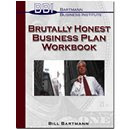Many businesses that fail do not have a good business plan. Your business plan is an essential step in your education as you clearly define the goals of what you are doing, why your are doing it and how you are going to accomplish it. You are not writing a novel to impress the public; you are preparing this document for yourself and for others that you will have a business relationship with, including lenders, partners, vendors and suppliers. Your business plan will demonstrate how you will succeed; and therefore, they will succeed.
Lenders will look at your business plan and come to a conclusion that they can or cannot safely invest in your business. If you present them with a plan that shows a business that has great potential, then they are more willing to fund your business. They know there is a good chance that you will repay the loan, with a good return.
If you plan to enter into a partnership, then you must earn the trust of your partner, so he will be willing to invest time and money into the venture. Your business plan should demonstrate, clearly and concisely, your vision of how the business is going to look.
You can negotiate lines of credit with vendors if you show them a clear business plan. They will want you to succeed so that you become a regular customer; therefore, building their business.
Your business plan should demonstrate that you are serious and focused on your commitment to build a successful business. You need to demonstrate skills, knowledge, experience and what makes you stand out from the rest of the companies in your industry.
So, how do you present all of this? The rule is “thin to win.” The more “wordy” you are, the less you know; the less you understand what you are getting into. An efficient business plan looks very crisp and clean, with easy to read font. Many experts have created many styles of business plans. Here is an overview of what should be in a business plan:
The Executive Summary is very important; it is the first part of the business plan; how well it is written and the message it conveys will determine the reader’s interest in reading the rest. The Executive Summary contains:
Your Vision Statement
Your Mission Statement
Goals
Strategies
Action Steps
Table of Contents
Company Background – This section contains the name of the company, your personal history in the business, your experience and the stage of development you company is at. It’s OK to disclose if you are a new start-up. Describe what makes your company unique, patents, trademarks, knowledge, experience and anything that sets you apart from your competitors. Do you have any industry advantages, a better system or are you in a prime location?
Products, Goods and Services – Here, you describe your products and services and how they benefit consumers. Demonstrate uniqueness, value and reasons why you feel more people will purchase from you than from your competition.
Market Analysis – This section will show your business as one with the capacity to survive; the ability to sell your product or services. You will be demonstrating your understanding of the economics of your business if you clearly describe the strengths, weaknesses, threats and opportunities that are part of your business. Being able to recognize where you might be weak and what you intend to do shows you thought things through. Recognizing possible threats to your business, like market trends, fads, advances in technology, etc… will also demonstrate good planning. Stating possible opportunities that can come from your business helps a lot too.
Marketing Tactics – Describe your retail techniques and pricing analysis. Show that you understand your market and how you determined the price of your goods or services.
Management Team – This section is about you and the key managers or department heads in your business. It does not contain long bios; just credentials and qualifications that are significant to your business. This section is also used to disclose how you compensate the key people in your business; their annual salary. You will also include staffing milestones here; if you plan to hire more people, when you plan to do so, and how many employees you project your company will grow to support.
Operations Plan – Here, you share more relevant information about your business and its assets, including plant and equipment; describe the physical facility. How much working capital is needed and how will it be spent? How do you plan to find quality help and train them to develop your labor force?
Financial Statements – If you have a history, here is where you put your Profit and Loss, Cash Flow Reports and Balance Sheet for each year. Also include future projections; what you think you will make in the next few years and how your numbers are realistic based on available data.
Funding – This section is a brief Loan Proposal. Provide a brief overview of your loan request; how much you need, the type of financing you want and the terms of financing desired. Lenders like to see that you have thought about the financial stability of the business and that you understand something about how financing works. Define the terms that will work in your business and how you came to figure this out. Will you require long-term or short-term financing? Will you pay monthly, quarterly or annually?
Use of Capital – What will you use the borrowed money for? Will it go toward the purchase or lease of a building, equipment, beginning inventory, operating capital or something else? How will this loan help you to be successful running your business to ensure your ability to repay the debt? Provide references to your previous funding history, loans you’ve repaid before. Provide business references in this section to give testimony of your past business practices; delivered as promised, performed excellent service, quick, timely, honest and dependable, etc...
Your business plan should distinguish you from your competition. It is a very important part of your Loan Proposal Document which will be used by lending institutions, private investors, potential partners and anyone that you will have a business relationship with who will want you to succeed.
Bill Bartmann has borrowed billions of dollars from hundreds of lenders and investors; he is experienced at handling the negotiations and presenting himself and his business in a positive light. His course covers all the details you need to know about customizing an effective business plan for your business. Bill Bartmann’s Billionaire Business Systems is an online course that has guided many entrepreneurs to business success. Learn more at http://www.billionaireu.com
Subscribe to:
Post Comments (Atom)





Hello,
ReplyDeleteThank you for all this information.
Can you tel me if they are any training in USA regarding Bill Bartmann business.
The Le_Meridian Funding Service went above and beyond their requirements to assist me with my loan which i used expand my pharmacy business,They were friendly, professional, and absolute gems to work with.I will recommend anyone looking for loan to contact. Email..lfdsloans@lemeridianfds.com Or lfdsloans@outlook.com.
ReplyDeleteWhatsApp ... + 19893943740.